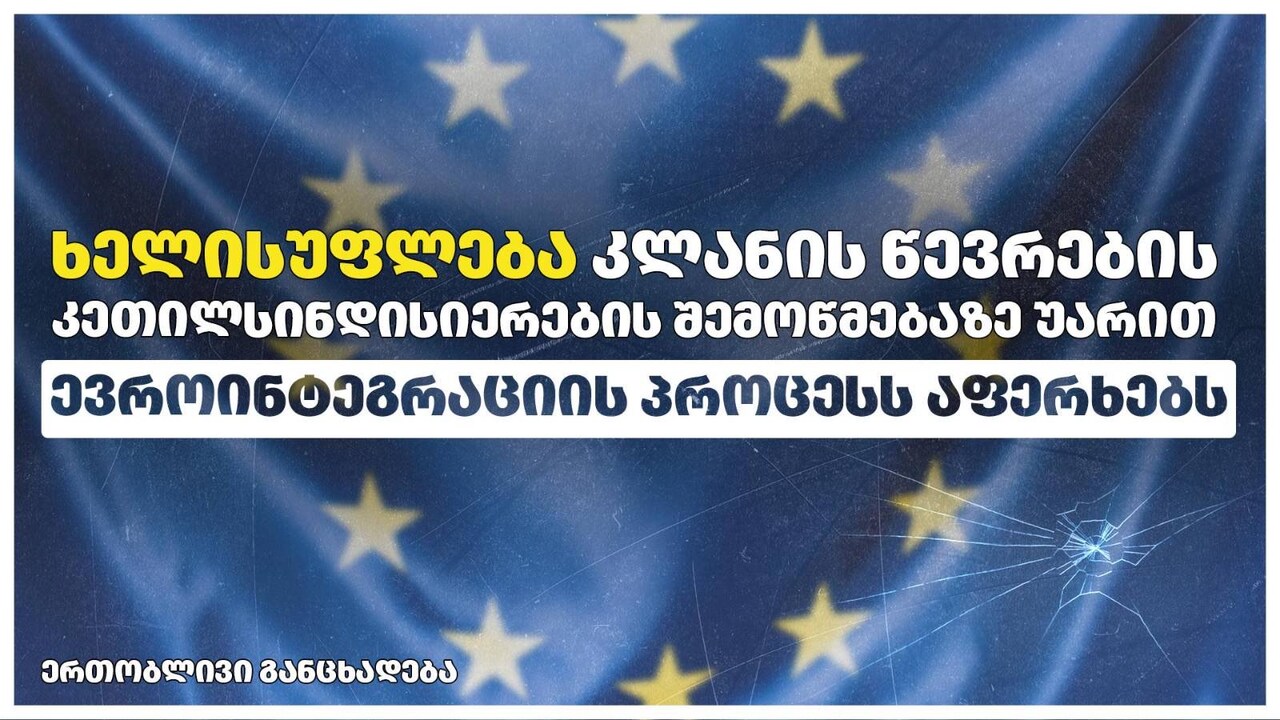By refusing to check the integrity of the judicial clan, the government is hindering the process of European integration

The European Commission report of November 8, 2023 states that to ensure a truly independent and impartial judiciary in Georgia, the national government, along with fulfilling other conditions, should set up a temporary mechanism for integrity checking. Members of the High Council of Justice, judges of the Supreme Court, court chairpersons, and candidates seeking appointment to these positions should undergo integrity checks.
Statements made by government representatives make it clear1 that they consider the above-mentioned condition unacceptable and therefore refuse to establish such a mechanism. It is worth noting that the government rhetoric has been taken up by those people, and the idea of integrity check has been opposed by those judges whose integrity is seriously questioned by the public.
For example, Shalva Tadumadze,2 a lifetime Supreme Court judge whose diploma’s authenticity raises many questions among society,3 is against the idea of integrity check. Similarly Levan Murusidze,4 whose name has long been associated with the unfair administration of justice in the country and who was designated by the United States for involvement in significant corruption, also opposes integrity checks. Additionally Vladimer Kakabadze,5 a lifetime judge at the Supreme Court known for involvement in one of the most high-profile cases involving Philip Morris,6 does not see the necessity of integrity checks.
The Supreme Court is also against the idea of checking the integrity of a select group of judges occupying specific positions as outlined in the EU recommendations.7 They have claimed that the “vetting” does not fall under international standards and that the Supreme Court judges do not need additional checks as their integrity was already checked during the process of their selection for the position.
First, it should be emphasized that the process of integrity check is in full compliance with international standards, a fact that has already been recognized by the European Court of Human Rights.8 In addition, the process of selecting judges for the Supreme Court, which was marked by irregularities, has been the subject of criticism by local and international organizations.9 Negative assessments were made, among others, by the Office for Democratic Institutions and Human Rights of the Organization for Security and Cooperation in Europe (OSCE/ODIHR), which monitored the process.10 Given that the process of interviewing candidates was broadcast live, the public is also well aware of the shortcomings of the process.
Proceeding from all of the above, we believe that the government should recognize the problems in the judicial system in a timely manner and begin to take the steps envisaged in the nine steps prescribed for Georgia by the European Commission.
Transparency International Georgia
Georgian Democracy Initiative
Georgian Court Watch
Democracy Defenders
Civil Society Foundation
[1] “What does the Georgian Dream’s refusal to carry out ‘vetting’ in the judiciary mean?” Netgazeti, February 25, 2024; accessible at: https://netgazeti.ge/life/710803/.
[2] “Shalva Tadumande: ‘Who is going to vet me, failed lawyers, and corrupt politicians?’” Rustavi 2, March 11, 2024; accessible at: https://rustavi2.ge/ka/news/277260?fbclid=IwAR1k1_HncGuqKNUmcTdsM2LgPQe2xru775OKr2hrGGEbnsvmcNsauBFM-YQ.
[3] “Questions concerning authenticity of Tadumadze’s diploma must be answered,” Transparency International Georgia, October 09, 2017; accessible at: https://transparency.ge/en/blog/questions-concerning-authenticity-tadumadzes-diploma-must-be-answered. “The Prosecutor General’s diploma still raises questions,” the Coalition for an Independent and Transparent Judiciary, October 17, 2019; accessible at: https://coalition.ge/index.php?article_id=220&clang=1. “Monitoring Report on the Selection of Supreme Court Judicial Candidates by the High Council of Justice of Georgia,” Public Defender, 2019, pp. 19-20; accessible at: https://ombudsman.ge/res/docs/2019110317223567554.pdf.
[4] “Levan Murusidze against so-called vetting,” Netgazeti, March 4, 2024; accessible at: https://netgazeti.ge/news/712078/.
[5] The screenshot of the comment by judge Levan Kakabadze; accessible at: https://drive.google.com/file/d/1Z5gEntw3Gao8uJZN_UlyNO8m10fXa2NE/view?usp=sharing.
[6] “The Court decision on the imposition of up to GEL 93 million on Philip Morris raises questions,” Transparency International Georgia, March 30, 2017; accessible at: https://www.transparency.ge/en/blog/court-decision-imposition-gel-93-million-philip-morris-raises-questions; “Ian Kelly speaks about penalties imposed on the US companies, Philip Morris and GAA,” Tabula, March 16, 2018; accessible at: https://tabula.ge/ge/news/606670-ian-keli-amerikuli-kompaniebis-philip-morris-isa.
[7] The Supreme Court’s statements, March 11, 2024; accessible at: https://www.facebook.com/SupremeCourtOfGeorgia/posts/pfbid0bpwhXPS4GNuRqSkRBX1hNFGYMWg7JFiuC5k1J7DtJ7TzdGepeaBotFi7Yau44e43l.
[8] Case of Xhoxhaj v. Albania, no. 15227/19, 9 February 2021; accessible at: https://hudoc.echr.coe.int/?i=001-208053.
[9] “EU Slams Top Court Appointments in Georgia,” civil.ge, December 02, 2021; accessible at https://civil.ge/archives/459326; “U.S. Embassy Disappointed with Continued Top Court Selection,” civil.ge, November 26, 2021; accessible at: https://civil.ge/archives/458068.
[10] The report of the OSCE Office for Democratic Institutions and Human Rights (ODIHR), January 9, 2020; accessible at: https://www.osce.org/odihr/443500.






























